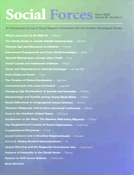-
Views
-
Cite
Cite
W. Bradford Wilcox, Steven L. Nock, What's Love Got To Do With It? Equality, Equity, Commitment and Women's Marital Quality, Social Forces, Volume 84, Issue 3, March 2006, Pages 1321–1345, https://doi.org/10.1353/sof.2006.0076
Close - Share Icon Share
Abstract
The companionate theory of marriage suggests that egalitarianism in practice and belief leads to higher marital quality for wives and higher levels of positive emotion work on the part of husbands. Our analysis of women's marital quality and men's marital emotion work provides little evidence in support of this theory. Rather, in examining women's marital quality and men's emotional investments in marriage, we find that dyadic commitment to institutional ideals about marriage and women's contentment with the division of household tasks are more critical. We also show that men's marital emotion work is a very important determinant of women's marital quality. We conclude by noting that “her” marriage is happiest when it combines elements of the new and old: that is, gender equity and normative commitment to the institution of marriage.



